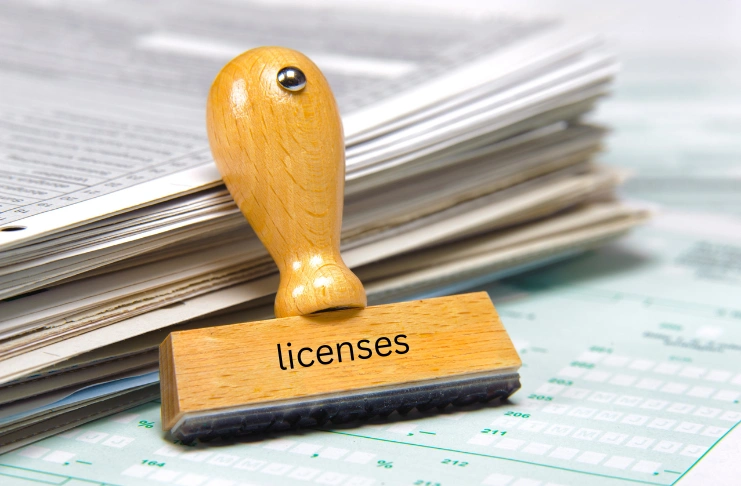Opening a restaurant is an exciting entrepreneurial journey, offering immense opportunities in the rapidly growing food service industry. However, understanding what licenses and permits are required to open a restaurant is crucial for a legally compliant and successful launch. Navigating restaurant business licenses can be overwhelming, especially for first-time restaurateurs, as failing to obtain the necessary approvals from the restaurant license list can result in legal penalties, hefty fines, or even forced closure.
The success of a restaurant depends not only on great food and customer service but also on full compliance with regulatory requirements. The required licenses and restaurant permits cover a range of legal aspects, including food safety, business operation, fire safety, taxation, and employee welfare.
This guide will break down the license requirements for a new restaurant in India, their application processes, costs, and key details.
Understanding the Regulatory Landscape for Restaurants in India
From the FSSAI food safety certification to trade licenses, fire safety clearances, and zoning department approvals, there are multiple restaurant permits required for a new restaurant before opening their doors.
Each license required for a restaurant, including a dumpster placement permit, has specific eligibility criteria, application processes, and renewal guidelines, which vary based on size, location, and business model. Let’s first understand the regulatory landscape for restaurants in India:
- Many restaurants in India lack proper licenses, risking legal penalties and shutdowns. Compliance is essential for smooth operations.
- In a survey conducted in April 2024, a majority of consumers expressed low or no confidence in the food safety in India.
- With the food industry growing fast, following legal requirements ensures long-term success. Entrepreneurs must secure the proper licenses for hygiene and business standards.
- Proper licensing guarantees compliance with hygiene norms, safeguarding both customers and businesses. It also boosts credibility and builds consumer trust.
Securing the necessary licenses is not just a legal necessity but a strategic move to establish a reputable and sustainable restaurant business in India’s competitive food industry.
Things to Consider While Applying for Restaurant Licenses

Before applying for a restaurant license, consider the following:
- State-Specific Regulations: Licensing rules vary across states, so always check local requirements.
- License Validity & Renewal: Many licenses require annual renewals, so plan accordingly.
- Documentation Readiness: Incomplete paperwork can delay approvals; ensure all documents are in order.
- Business Model Impact: Licensing requirements differ for dine-in, takeaway, cloud kitchens, and bars.
- Financial Planning: Consider all licensing costs, including application fees, renewal charges, and potential penalties for non-compliance.
- Employee Training Certifications: Some licenses require proof of staff training in food safety and hygiene.
- Location Compliance: Your restaurant’s site must adhere to zoning laws and building codes to prevent license denial.
- Community Engagement: Engaging with local communities can help streamline approvals, especially if public consultations are required.
Types of Licenses Required for Restaurant Operations

There are several types of licenses that are required for restaurants in India. Read ahead to know all the licenses you might require to make your dream come true.
1. Food Safety and Standards Authority of India (FSSAI) License
Obtaining an FSSAI license, health permit, and building health permit is mandatory for all food businesses in India. This critical license ensures food safety and quality standards.
Key Requirements:
- Detailed food safety management plan
- Hygiene and sanitation documentation
- Proof of food handling training
- Kitchen infrastructure details
An FSSAI License has a basic registration fee, which is ₹100 per annum for small businesses, a state license fee of ₹2,000 per annum based on turnover, and a central license fee of ₹7,500 per annum for large businesses. Without an FSSAI license, your restaurant cannot legally operate in India. Always set aside extra funds for potential processing fees and unforeseen costs and research well before starting.
INDUSTRY INSIGHT
| Every owner must get an FSSAI Registration done before starting a restaurant business in India. FSSAI has an established eligibility criteria as per the format of your restaurant for a successful registration. FSSAI defines a restaurant as– “a type of food service operation that prepares and serves customers food and drinks in exchange for money. Meals are generally served and eaten on the premises, but many restaurants also offer take-out and food delivery services, and some offer only take-out and delivery.” Based on your turnover, the required license and charge is determined, for instance, for turnover up to 20 Crores per annum, you will require a Central License, worth ₹7,500. |
2. Trade License from Municipal Corporation
Every restaurant must obtain a trade license under its business name from the local municipal corporation, validating the business’s right to operate in a specific location.
Crucial Components:
- Detailed business blueprint
- Proof of property ownership or rental agreement
- No-objection certificate from the landlord
- Detailed business activity description
- The cost of a Municipal Trade License ranges between ₹5,000 – ₹25,000, depending on location and business size. To know the exact Municipal Trade License costs, visit your state’s website to know the exact cost in your state.
A Trade License from the Municipal Corporation demonstrates compliance with local municipal regulations.
3. Health Trade License
Issued by local health departments, the employee health permit and this license confirm that your restaurant meets essential health and hygiene standards.
Key Verification Points:
- Kitchen cleanliness assessment
- Water quality certification
- Waste management protocols
- Staff health certificates
Health Trade License from the health department ensures that public health safety standards are maintained.
4. Fire Safety License
Restaurants must obtain a fire safety clearance to protect against potential fire hazards.
Mandatory Checks:
- Fire extinguisher installations
- Emergency exit plans
- Electrical system safety
- Occupancy load verification
- Cost of Fire Safety License ranges from ₹10,000 – ₹50,000, based on the restaurant’s size and safety requirements. Given the absence of a centralized source combining costs across all states in India, consult websites of respective states’ fire departments to know more.
Fire Safety License protects customers and staff from potential fire-related risks.
5. Liquor License (If Applicable)
Restaurants planning to serve alcohol must secure an alcoholic beverage license and separate liquor license from state excise departments.
Specific Requirements:
- Detailed establishment layout
- Background verification of owners
- State-specific excise regulations compliance
- Annual renewal procedures
For a Liquor License, ₹2.5 lakh to ₹7.5 lakh is charged, varying by state and city classification are charges for liquor license. Visit the source to know your state/city’s liquor license costs. An important thing to note is that liquor licensing varies significantly across different Indian states.
6. GST Registration
While not exclusively a restaurant license, GST registration is a mandatory financial compliance requirement.
Registration Essentials:
- PAN card details
- Business registration documents
- Estimated annual turnover information
- Bank account verification
Tax compliance, for taxes like federal tax, is critical for legal financial operations.
7. Employee-Related Licenses
Restaurants must comply with labor regulations through specific registrations.
Required Registrations:
- Employees’ Provident Fund (EPF) registration
- Employees’ State Insurance (ESI) registration
- Professional tax registration
Ensures comprehensive employee welfare compliance and protects workers.
8. Environmental Clearance License
Restaurants must demonstrate a commitment to environmental sustainability through this critical license.
Key Details:
- Purpose: Ensure compliance with pollution control norms
- Issued By: State Pollution Control Board
- Scope: Particularly crucial for large restaurant establishments
Documents Required:
- Non-Objection Certificate (NOC) from local authorities
- Comprehensive environmental impact assessment report
- Detailed waste management plan
- Proof of eco-friendly practices
Licensing Specifics:
- Validity: 5 years (renewable)
- Application Process: Direct application to respective state pollution control boards
Environmental clearance license demonstrates commitment to sustainable business practices.
9. Signage License
Restaurants need official permission to display advertisements and external signboards.
Licensing Essentials:
- Issued By: Local Municipal Corporation
- Purpose: Regulate and approve external business signage
Required Documentation:
- Business registration certificate
- Detailed signage design for approval
- Compliance with local aesthetic and safety regulations
- Dimensional specifications of proposed signage
Application Procedure:
- Submit detailed application to local municipal authorities
- Pay prescribed signage display fees
- Await design and placement approval
A Signage License ensures legal and aesthetic signage display.
10. Music License
A music license is critical for restaurants planning to play background or live music.
Licensing Requirements:
- Issued By: Phonographic Performance Limited (PPL) and Indian Performing Rights Society (IPRS)
- Purpose: Legal permission to play copyrighted musical content
Key Considerations:
- Covers recorded and live music performances
- Protects intellectual property rights of musicians
- Mandatory for any commercial music playback
Licensing Details:
- Validity: 1 year (renewable annually)
- Application Process: Apply directly to PPL India with a simultaneous application to IPRS
- Fee Structure: Varies based on restaurant size and music usage
Supports and respects musical intellectual property.
Timelines and Processing

Each license comes with its own processing duration, and local government requirements should be factored into your restaurant launch timeline:
- FSSAI License: Typically takes 30 to 45 days to process.
- Municipal Trade License: Generally issued within 15 to 30 days.
- Fire Safety License: The Approval process usually takes 45 to 60 days.
- Liquor License: This can take 60 to 90 days, depending on state regulations.
Start your applications well in advance for your restaurant space to prevent delays impacting your restaurant’s opening. By planning for both costs and timeframes, restaurateurs can ensure smooth permits and licenses approval and legal compliance.
Common Challenges in Restaurant Licensing

Navigating the restaurant licensing landscape in India presents several challenges that aspiring restaurateurs must address to ensure compliance and operational success. Key issues include:
- Incomplete Documentation: Incomplete documentation can cause delays and rejections, making proper paperwork essential.
- Lengthy Government Processing: Lengthy Government processing can postpone restaurant openings, requiring early application submissions.
- Frequent Regulatory Changes: Frequent regulatory changes demand continuous monitoring to ensure compliance with evolving laws.
- Complex Multi-department Approvals: Complex multi-department approvals make the process time-consuming, requiring coordination with various authorities.
- Missing/Forgetting Renewals: Missing or forgetting to renew essential permits can lead to penalties, operational disruptions, or shutdowns.
Hiring legal experts can help streamline licensing and prevent unnecessary delays. Engage local legal consultants specializing in restaurant regulations.
Leveraging Technology for Licensing Compliance

Modern restaurant management tools, particularly Point-of-Sale (POS) systems, play a crucial role in simplifying licensing compliance with minimal manual effort. Here’s how a POS system can aid in meeting licensing requirements:
- Digital Tax Compliance ensures accurate GST calculations and seamless tax reporting.
- Automated Record-Keeping helps maintain digital transaction logs, making audits and license renewals easier.
- Compliance Integration allows some POS systems to connect with FSSAI, GST, and tax portals for effortless regulatory reporting.
- Real-time sales Tracking helps monitor revenue to ensure compliance with turnover-based licensing thresholds like GST registration.
- Invoice & Billing Compliance ensures that all transactions follow legal invoicing standards, reducing tax discrepancies.
- Audit Preparation simplifies financial and regulatory audits by keeping transaction records easily accessible.
Conclusion
Securing the required licenses for restaurants in India demands careful planning and compliance. Entrepreneurs must ensure proper documentation, stay updated on regulatory changes, and allow time for government approvals to avoid delays.
A well-structured restaurant business license list helps streamline operations and ensures legal compliance, as occupancy varies depending on the type of licens protecting the business from fines or shutdowns. Consulting local legal experts simplifies the process and ensures adherence to state-specific regulations.
By prioritizing licensing, like for instance, obtaining a state liquor license, restaurant owners can enhance credibility, customer trust, and long-term success in India’s growing food service industry. Always check with local authorities for the latest requirements and allocate resources wisely.
Disclaimer: Licensing requirements may vary by state and are subject to periodic updates. Always verify current regulations with local authorities.
Frequently Asked Questions
1. What license do I need to serve food in California?
You need a Food Handler’s Permit and a Health Permit from the local health department. If you’re serving alcohol, a license from the California Department of Alcoholic Beverage Control (ABC) is also required.
2. What permits do I need to open a restaurant in Texas?
You need a Food Establishment Permit from the Texas Department of State Health Services, a Sales Tax Permit, and a Business License. Additional permits may include a Liquor License and a Sign Permit.
3. What permits are needed to open a restaurant in Illinois?
To open a restaurant in Illinois, you need a Retail Food Establishment License, Business License, and Health Department Permit to ensure compliance with food safety regulations. If you plan to serve alcohol, obtaining an Alcohol Beverage License is mandatory. Additional permits may be required based on location and specific business operations.
4. What permits do I need to sell food in California?
You need a Cottage Food Permit for home-based sales or a Food Facility Health Permit for commercial kitchens. A Seller’s Permit from the California Department of Tax and Fee Administration is also required along with a Business License.
5. What licenses are needed to start a restaurant in India?
You need an FSSAI License, Trade License, Health/Trade Permit, and Shop & Establishment Act License. Additional licenses include an Eating House License and Liquor License, if applicable.
6. How many types of food licenses are there in India?
India has three types of FSSAI licenses based on business size and turnover. Basic Registration is for small businesses with an annual turnover of up to ₹12 lakh. A State License is required for mid-sized businesses with a turnover between ₹12 lakh and ₹20 crore, while a central license is mandatory for large food businesses exceeding ₹20 crore in turnover or operating across multiple states.
7. How much does it cost to open a 5 star restaurant in India?
The cost varies from ₹2 crore to ₹5 crore or more, depending on location, size, interior design, and licensing fees. High-end real estate and staff salaries contribute to expenses.
8. What are the licenses required for a cafe in Bangalore?
You need an FSSAI License, Trade License, Health License, Fire Safety License, and a Shop & Establishment License. If serving alcohol, an Excise License is required.
9. Do you need a license to sell food in PA?
Yes, a Retail Food Facility License from the Pennsylvania Department of Agriculture is required. Home-based sellers may need a Home Kitchen License or Cottage Food License, and a Local Business License.
10. What permits do I need for a restaurant in San Bernardino County?
To open a restaurant in San Bernardino County, you need a Health Permit, Business License, Food Facility Permit, and Fire Safety Permit to ensure compliance with local health and safety regulations. Additional permits may be required if your restaurant includes outdoor seating or signage. It’s best to check with the San Bernardino County Environmental Health Services and local city authorities for specific requirements.
11. Do you need a license to open a restaurant in NY?
Yes, a Food Service Establishment Permit, Business License, and Certificate of Occupancy are required. If selling alcohol, an Alcohol Beverage Control (ABC) License is needed.





